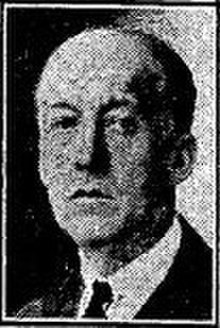Arthur Ponsonby, 1st Baron Ponsonby of Shulbrede
|
The Right Honourable The Lord Ponsonby of Shulbrede |
|
|---|---|
 |
|
| Chancellor of the Duchy of Lancaster | |
|
In office 13 March – 25 August 1931 |
|
| Prime Minister | Ramsay MacDonald |
| Preceded by | Clement Attlee |
| Succeeded by | The Marquess of Lothian |
| Parliamentary Secretary to the Ministry of Transport | |
|
In office 1929–1931 |
|
| Preceded by | The Earl Russell |
| Succeeded by | John Allen Parkinson |
| Personal details | |
| Born | 16 February 1871 |
| Died | 23 March 1946 |
| Alma mater | Balliol College, Oxford |
Arthur Augustus William Harry Ponsonby, 1st Baron Ponsonby of Shulbrede (16 February 1871 – 23 March 1946) was a British politician, writer, and social activist. He was the third son of Sir Henry Ponsonby, Private Secretary to Queen Victoria, and the great-grandson of Frederick Ponsonby, 3rd Earl of Bessborough. Frederick Edward Grey Ponsonby, 1st Baron Sysonby, was his elder brother.
Ponsonby is often quoted as the author of the dictum "When war is declared, truth is the first casualty", published in his book Falsehood in War-time, Containing an Assortment of Lies Circulated Throughout the Nations During the Great War (1928). However, he uses this phrase in quotation marks as an epigram at the start of the book and does not present it as his own words. Its likely origin is the almost identical line spoken in 1917 by the United States Senator Hiram Johnson: "The first casualty when war comes is truth".
Ponsonby was a Page of Honour to Queen Victoria from 1882 to 1887. He was educated at Eton College. While at Eton, Ponsonby was whipped for organising a steeplechase in his dormitory.
Ponsonby studied at Balliol College, Oxford, before joining the Diplomatic Service and taking assignments in Constantinople and Copenhagen.
At the 1906 general election, Ponsonby stood unsuccessfully as Liberal candidate for Taunton. He was elected as Member of Parliament for Stirling Burghs at a by-election of 1908 (in place of the previous Prime Minister Henry Campbell-Bannerman, who had just died).
...
Wikipedia
